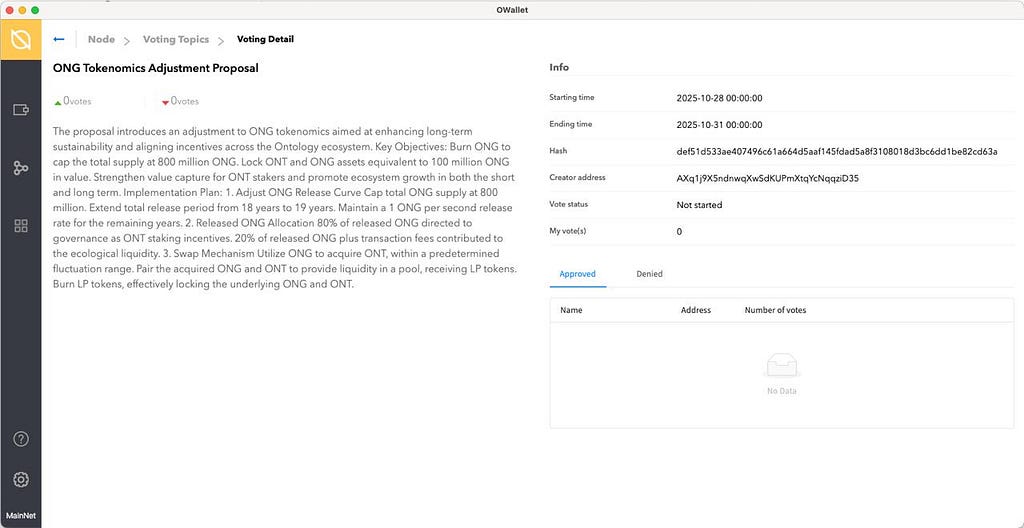A New Chapter for ONG: Governance Vote on Tokenomics Adjustment
2
0

Ontology’s token economy has always been designed to evolve alongside the network. This week, that evolution takes another step forward. A new governance proposal has been initiated by an Ontology Consensus Node, calling on all Triones nodes to vote on an update to ONG tokenomics. The update aims to strengthen the foundation for long-term sustainability and fairer incentives across the ecosystem.
Voting will take place on OWallet from October 28, 2025 (00:00 UTC) through October 31, 2025 (00:00 UTC).
Understanding the Current Model
Let’s start with where things stand today.
- Total ONG Supply: 1 billion
- Total Released: ≈ 450 million (≈ 430 million circulating)
- Annual Release: ≈ 31.5 million ONG
- Release Curve: All ONG unlocked over 18 years.
- The remaining 11 years follow a mixed release pace: 1 ONG per second for 6 years, then 2, 2, 2, 3, and 3 ONG per second in the final 5 years.
Currently, both unlocked ONG and transaction fees flow back to ONT stakers as incentives, generating an annual percentage rate of roughly 23 percent at current prices.
What the Proposal Changes
The new proposal suggests several key adjustments to rebalance distribution and align long-term incentives:
- Cap the total ONG supply at 800 million.
- Lock ONT and ONG equivalent to 100 million ONG in value, effectively removing them from circulation.
- Strengthen staker rewards and ecosystem growth by making the release schedule steadier and liquidity more sustainable.
Implementation Plan
1. Adjust the ONG Release Curve
- Total supply capped at 800 million.
- Release period extended from 18 to 19 years.
- Maintain a 1 ONG per second release rate for the remaining years.
2. Allocation of Released ONG
- 80 percent directed to ONT staking incentives.
- 20 percent, plus transaction fees, contributed to ecological liquidity.
3. Swap Mechanism
- Use ONG to acquire ONT within a defined fluctuation range.
- Pair the two tokens to create liquidity and receive LP tokens.
- Burn the LP tokens to permanently lock both ONG and ONT, tightening circulating supply.
Community Q & A
Q1. How long will the ONT + ONG (worth 100 million ONG) be locked?
It’s a permanent lock.
Q2. Why does the total ONG supply decrease while the release period increases?
Under the current model, release speeds up in later years. This proposal keeps the rate fixed at 1 ONG per second, so fewer tokens are released overall but over a slightly longer span — about 19 years in total.
Q3. Will this affect ONT staking APY?
It may, but not necessarily negatively. While staking rewards in ONG drop 20 percent, APY depends on market prices of ONT and ONG. If ONG appreciates as expected, overall returns could remain steady or even rise.
Q4. How does this help the Ontology ecosystem?
Capping supply at 800 million and permanently locking 100 million ONG will make ONG scarcer. With part of the released ONG continuously swapped for ONT to support DEX liquidity, the effective circulating supply may fall to around 750 million. That scarcity, paired with new products consuming ONG, could strengthen price dynamics and promote sustainable network growth. More on-chain activity would also mean stronger rewards for stakers.
Q5. Who can vote, and how?
All Triones nodes have the right to vote through OWallet during the official voting window.
Why It Matters
This isn’t just a supply adjustment. It’s a structural change designed to balance reward distribution, liquidity, and governance in a way that benefits both the Ontology network and its long-term participants.
Every vote counts. By joining this governance round, Triones nodes have a direct hand in shaping how value flows through the Ontology ecosystem — not just for today’s staking cycle, but for the years of decentralized growth ahead.
A New Chapter for ONG: Governance Vote on Tokenomics Adjustment was originally published in OntologyNetwork on Medium, where people are continuing the conversation by highlighting and responding to this story.
2
0
 Manage all your crypto, NFT and DeFi from one place
Manage all your crypto, NFT and DeFi from one placeSecurely connect the portfolio you’re using to start.




